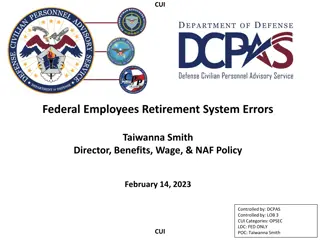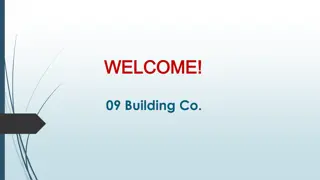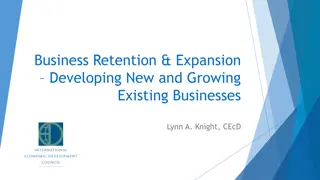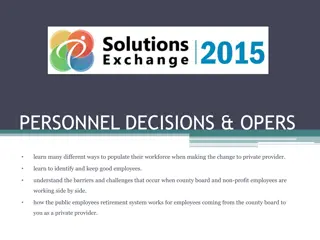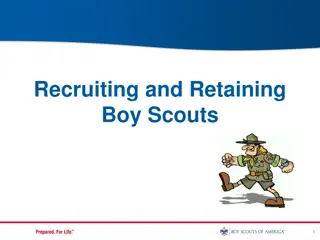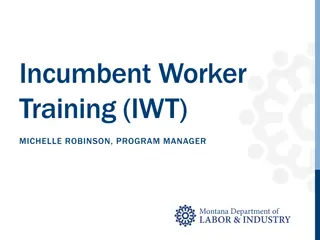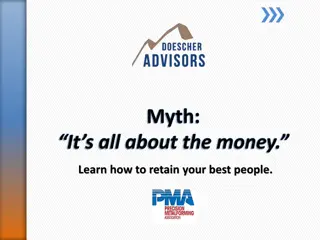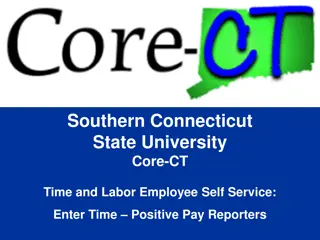Tips for Retaining Key Employees in Your Business
Being a solo entrepreneur can be challenging when it comes to hiring and retaining key employees. Learn how to effectively hire and retain top talent through proper onboarding, education, training, and showing appreciation.
Download Presentation

Please find below an Image/Link to download the presentation.
The content on the website is provided AS IS for your information and personal use only. It may not be sold, licensed, or shared on other websites without obtaining consent from the author.If you encounter any issues during the download, it is possible that the publisher has removed the file from their server.
You are allowed to download the files provided on this website for personal or commercial use, subject to the condition that they are used lawfully. All files are the property of their respective owners.
The content on the website is provided AS IS for your information and personal use only. It may not be sold, licensed, or shared on other websites without obtaining consent from the author.
E N D
Presentation Transcript
Entrepreneur Entrepreneur Local Learning Centers Local Learning Centers
SEMINAR 22: HOW TO RETAIN KEY EMPLOYEES Being a solo entrepreneur is never easy. If your business grows, you may begin to need help either because of a lack of expertise or due to an increase in workload. Key employees play an essential role in your business operations. They contribute to the success of a business by helping it reach and exceed goals. In addition, Having accountable people who care about the business s success will allow you to free yourself from day-to-day operations and take on your role as leader and manager. You may not yet have the means to pay competitive salaries, and turnover can be costly because of the time you need to invest in training and for the new hires to fully perform! Here are some tips to achieve both the effective hiring and retaining of your employees.
Hiring and Onboarding Strong Employee Retention Starts Beginning You should have a minimum of preparation before recruiting. You may have little or no personal experience in hiring; it can be challenging to assess resumes or know what to ask during interviews. In order to succeed: Be honest and stay professional! Prepare well; you want to be able to evaluate a candidate correctly or persuade them to accept a job offer. Take the time to read the candidate s resume, print a copy for reference during the interview. Inspire and motivate! Explain the company's vision, structure, and perks and benefits for the job. Don t make misleading promises! Continued on next slide
Hiring and Onboarding cont d. Do your due diligence; you should contact the references provided by the candidate to check their job application and what they said in their interview. Keep it clean and simple! You should present a written job offer that outlines basic information such as financial and other compensation, any probationary period, leave and vacation terms, work hours, the job title and a detailed description of tasks, the start date, etc. Onboarding is also crucial! Your new hires are most impressionable during the first two months. Give new employees quality time, even if you are busy on daily tasks, and give all the support to get them up to speed quickly, then keep them engaged with training, job aids, and tools they need. Make them feel part of the team!
Education and Training Providing education and training for employees can contribute to their sense of value to the company. It can also help employees feel that they are making improvements. Education and training will cost you, but consider investing in key employees like investing in the future of the business; the more prepared they are, the more it will positively impact your company in the long run!
Show Appreciation and Respect On top of pay, saying thank you for a job well done goes a long way. Please make sure you regularly show your top employees that you appreciate them. This can include publicly recognizing employees for their achievements, celebrating birthdays, and providing positive reinforcement. As a small business owner dealing mainly with a cash business, monetary rewards, bonuses, and gifts make the thank you even more significant! In Addition Employees flourish in dynamic and entrepreneurial settings, making them feel invested in the company. Give them freedom and ownership of their work; by doing so, they will likely perform at a higher level and grow in their position.
Be Transparent and Get Their Feedback Have open communication in your boss-employee relationships daily. Constantly ask your employees for feedback on what's working and not. Give them a chance to have input and suggest ideas. Let your key employees get familiar with what's going on in the business and how their work impacts customer satisfaction and growth.
Family Business You decide to hire a cousin or your brother. Will they be running the show? Will you be able to maintain the difference between the professional and the personal? The risk of bringing misunderstandings and conflicts from home to the office remains. Also, some family members can be a little too comfortable in their position even if they are not in the driver s seat! The question is, will you be able to take action if family members misbehave? Family businesses have advantages. Beyond trusting family members, one of the greatest advantages of doing business as a family each member is already acquainted. The risk of conflict will tend to decrease since you know your associates and know their interests and weaknesses. Similarly, knowing your allies makes finding a resolution to a crisis or difficult situation more manageable.
Family Business Contd. However, there are still disadvantages and risks: - One of a family business s greatest risks is the presence of feelings and sentiments in business management. Apart from the fact that there is more leniency with the members of your family, members tend to be appointed important positions, sometimes without the necessary qualities. This practice can seriously harm the efficiency of the company. - It is critical to clearly define the roles of each before embarking on the adventure. This could considerably reduce the risk of tension between family members and your collaborators. Continued on next slide
Family Business Contd. - Even though you work with your family, a lack of interest and ambition can threaten the partnership. The member's interests are not always the same. This can be read as a deficiency of purpose and performance. Risk being let go and harming the performance of this one. Remember the roles and goals of each member should be regularly addressed to avoid misunderstanding! - The risk of rivalry remains more present in family businesses. After a while, the members may go to war with each other, especially the children, when it comes to inheritance. Everyone wants the role of leader. Of course, this doesn t always happen, and if a family is strong and healthy before entering into a business, these elements will likely be much smoother.
Insubordinate Employees The breaking of rules and counterproductive behavior of an employee is not to be taken lightly. Moreover, if you do not intervene with an underperforming employee, you could see your leadership questioned, which can lead to an degradation of the work climate. A problematic employee may need a little support. Meet with them to review the situation and clarify your expectations. Explain how their actions are unproductive or against the company polices, and show them what to do by providing guides or tools. Additionally, an action and improvement plan are suggested to document the facts and details on the situation and to formally engage the employee in the process while supervising them adequately and giving feedback.
GLOSSARY Click on the word to go back to that slide. - Onboarding : Onboarding refers to the process through which new employees acquire the necessary knowledge, skills, and behaviors in order to become effective team members. - Degradation : The process of breaking down or becoming worse; in a business sense, a employee s bad attitude can harm the workplace, leading to a degradation in office morale or efficiency.




